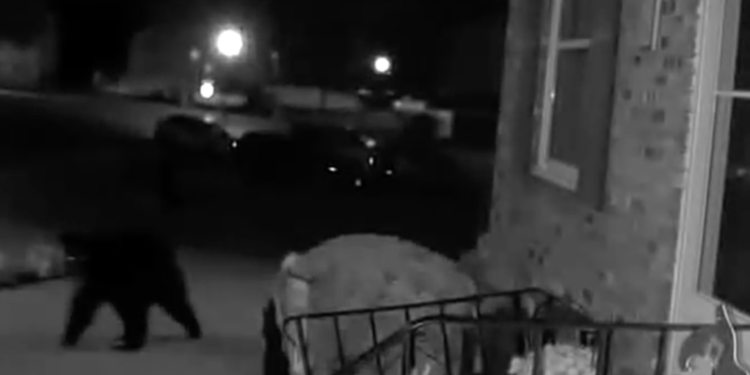COLONIE — A bear was seen wandering around a backyard in the heart of the village on Wednesday, Sept. 29, at around 1:50 a.m.
The black bear was captured by a surveillance camera of the residential home on Pine Avenue and stopped briefly when a light was activated by a motion detector before meandering off.
Colonie police are warning residents to follow state Department of Conservation guidelines to avoid having issues with bears, which are generally afraid of humans and do try to avoid contact with them.
To prevent issues with bears around homes the DEC recommends storing and disposing of garbage and removing bird feeders when bears are active. The simplest way to avoid issues with bears is to remove unnatural sources of food.
Also, DEC guidelines include:
- Never feed bears intentionally because it will attract them and is illegal.
- Never burn garbage, it is illegal and attracts bears, as does composting food scraps.
- To store garbage in lidded cans or dumpsters, and keep them in a secure place, such as a garage or shed. Put garbage out only on the morning of pickup.
- Feed birds only from Dec. 1 until April 1; however, birdseed and suet may attract bears at any time of the year. Remove feeders, seed, and suet whenever bears are problematic.
- Clean barbeque grills after every use; remove the grease can, and run the grill on “high” to burn off excess grease.
- Store your grill in a secure place when not in use.
- Feed pets indoors.
- Keep refrigerators and freezers in a secure place, and bring coolers inside when not in use.
If you need assistance with a nuisance bear, please contact your regional New
York State Department of Environmental Conservation wildlife office.
Once a bear has become a problem, DEC staff are often asked to move it. Unfortunately, that rarely solves the problem, according to the DEC. Relocated bears have been known to travel up to 300 miles to return to where they were caught. Bears that don’t return may continue their bad behavior at the new location.
Circumstances that led to the original problem must be corrected, or human-bear conflicts will persist.
If you see a bear, “don’t panic.”
“Enjoy the privilege of seeing a magnificent wild animal, but don’t lose sight of the fact that bears are powerful animals that will defend themselves if they feel threatened,” according to the DEC. “Never approach, surround or attempt to touch a bear. Always leave a clear escape route for a bear. If you feel threatened by a bear, back away slowly, but do not run. If the bear won’t leave, make loud noises—yell, clap, blow car horns or air horns, or drum on nearby objects.”



